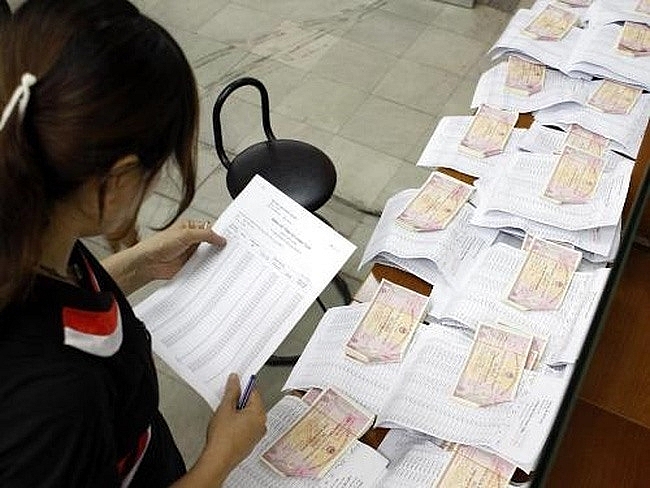Market value of Gov’t-bonds hits $44 billion
 |
| Market value of Government bonds (G-bonds) hit VNĐ1 quadrillion (US$44 billion) at the end of February, equivalent to 20 per cent of Việt Nam’s gross domestic product (GDP) in 2017.- Photo baohaiquan.vn |
The Hà Nội Stock Exchange reported that some VNĐ10.5 trillion ($462 million) worth of G-bonds were traded at each auction on an average in the first two months of 2018. It said sales and purchases of bonds and stocks accounted for more than 50 percent of the total transaction value of the market, showing the market’s high liquidity. This is also good news for investors interested in the bond market. To overhaul the regulatory framework for the development of G-bond markets next time, the Ministry of Finance issued a new circular last week regulating the issuance and transaction of G-bonds, effective from April 1.
Circular 15/2018/TT-BTC regulates the costs of issuance, swap, repurchase and payment of G-bonds, government-guaranteed bonds and municipal bonds. Under the new circular, the bidding fee to issue treasury bills at the State Bank of Việt Nam’s Operations Centre will be set at 0.01 per cent of the nominal value of treasury bills issued under the bidding mode.
The bidding fee to issue G-bonds at the stock exchanges will be equal to 0.025 per cent of the nominal value of G-bonds under the bidding mode, but no more than VNĐ1 billion per auction.
In terms of repurchasing G-bonds, the bidding fee is worth 0.0075 per cent of the buyback cost of sovereign bonds under the bidding mode, but no more than VNĐ300 million per auction.
The value of G-bonds issued in 2018 is estimated at some VNĐ180 trillion, with the focus being on long-term maturity and keeping the interest rate at low levels.
According to the Ministry of Finance, G-bonds worth VNĐ159.9 trillion were issued last year, up 4.81 per cent against 2016.
The Government last year also approved the roadmap for the development of the bond market from 2017 to 2020 with a vision for 2030, in which the outstanding debt in Việt Nam’s bond market is targeted at 45 per cent of the total GDP in 2020 and some 65 per cent of the GDP in 2030.
What the stars mean:
★ Poor ★ ★ Promising ★★★ Good ★★★★ Very good ★★★★★ Exceptional
Related Contents
Latest News
More News
- 0.1 per cent tax proposed on each transfer of digital assets (February 05, 2026 | 17:27)
- Ministry of Finance tightens policy delivery at start of year (February 05, 2026 | 17:26)
- Vietnam steps up market reforms as FTSE Russell reviews upgrade progress (February 05, 2026 | 17:20)
- 2025 profits mixed amid strong energy and farming results (February 05, 2026 | 17:18)
- Cashless payments hit 28 times GDP in 2025 (February 04, 2026 | 18:09)
- SSIAM and DBJ launch Japan Vietnam Capital Fund (February 04, 2026 | 15:57)
- Banks target stronger profits, credit growth in 2026 (February 04, 2026 | 15:43)
- Vietnam on path to investment-grade rating (February 03, 2026 | 13:07)
- Consumer finance sector posts sharp profit growth (February 03, 2026 | 13:05)
- Insurance market building the next chapter of protection (February 02, 2026 | 11:16)

 Tag:
Tag:


























 Mobile Version
Mobile Version